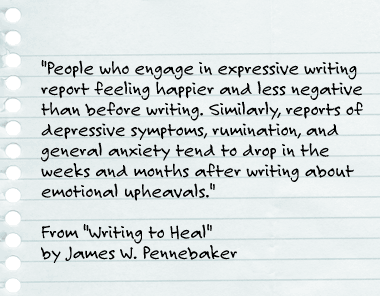
For nearly 20 years, Dr. James W. Pennebaker has been giving people an assignment: write down your deepest feelings about an emotional upheaval in your life for 15 or 20 minutes a day for four consecutive days. Many of those who followed his simple instructions have found their immune systems strengthened. Others have seen their grades improved. Sometimes entire lives have changed.
 |
Dr. James Pennebaker |
Pennebaker, a professor in the Department of Psychology at The University of Texas at Austin and author of several books, including “Opening Up” and “Writing to Heal,” is a pioneer in the study of using expressive writing as a route to healing. His research has shown that short-term focused writing can have a beneficial effect on everyone from those dealing with a terminal illness to victims of violent crime to college students facing first-year transitions.
“When people are given the opportunity to write about emotional upheavals, they often experience improved health,” Pennebaker says. “They go to the doctor less. They have changes in immune function. If they are first-year college students, their grades tend to go up. People will tell us months afterward that it’s been a very beneficial experience for them.”
 |
The Pennebaker Method For the next 4 days, write about a trauma, loss, or emotional event that profoundly affected you.
· Write for at least 20 minutes a day over the next 4 days. If you write for more than 20 minutes, that’s great. · You can write about the same event on all 4 days or about different events each day. Whatever you chose to write about, it should be something extremely personal and important for you. · Once you begin writing, write continuously without stopping. Don’t worry about spelling or grammar. If you run out of things to say, simply repeat what you’ve already written. This can be handwritten or typed. · Write only for yourself. Plan to destroy or hide what you have written. Do not turn this exercise into a letter. This exercise is for your eyes only, (unless you want to share it with your counsellor.) · The Flip-Out Rule. If you feel as though you cannot write about a particular event because it will “push you over the edge,” then don’t write about it. Deal only with those events or situations that you can handle right now. · What to expect after writing. Many people often feel somewhat saddened or depressed after expressive writing, especially on the first day or 2 of writing. If this happens to you, it is completely normal. The feeling usually lasts a few minutes, or in some cases, hours, much like going to a sad movie. Plan to have some time to yourself after you end your expressive writing session to reflect on the issues you have written about.
DAY 1 In today’s writing it is particularly important that you really let go and examine your deepest emotions and thoughts surrounding this upheaval in your life. As you write about this event, you might begin to tie it to other parts of your life.
How does it relate to your childhood, relationships with your parents, or close family members? How is it connected to those people you have most loved, feared, or been angry with? How is this upheaval related to your current life, friends, family, or work? Above, all, how is this event related to who you were in the past, who you would like to be in the future, and who you are now?
DAY 2 Today’s task is to really examine your very deepest emotions and thoughts. In your writing, try to link the trauma to other parts of your life. It’s important to realize that trauma or emotional upheaval often influence every aspect of your life, from relationships with friends and family, and how others view you, to how you view yourself, your work, and how you think about your past.
How is this trauma/emotional upheaval affecting your life in general? How might you be responsible for some of the effects of the trauma?
DAY 3 You have made it through 2 days of writing. Tomorrow, you will need to wrap up your story. Today it is important for you to continue the exploration of your deepest thoughts and emotions about the topics you have been tackling so far. You can focus on the same topics you have been examining or shift to another trauma or some other feature of the same trauma. Focus on your emotions and thoughts about those events that are affecting your life the most right now.
Explore the trauma from a different point of view than you have previously written. For example: How does a family member view the trauma or a trusted friend? As a result of this trauma, in what ways are you feeling particularly vulnerable?
DAY 4 This is the final day of writing. As on previous days, continue the exploration of your deepest thoughts and emotions about the trauma. Stand back and think about the events, issues, thoughts, and feelings that you have disclosed. Try to tie up anything that you haven’t yet confronted.
What are your emotions at this point as a result of this upheaval in your life? What have you learned, lost, and gained? How will these events from your past guide your thoughts and actions in the future? |
No comments:
Post a Comment